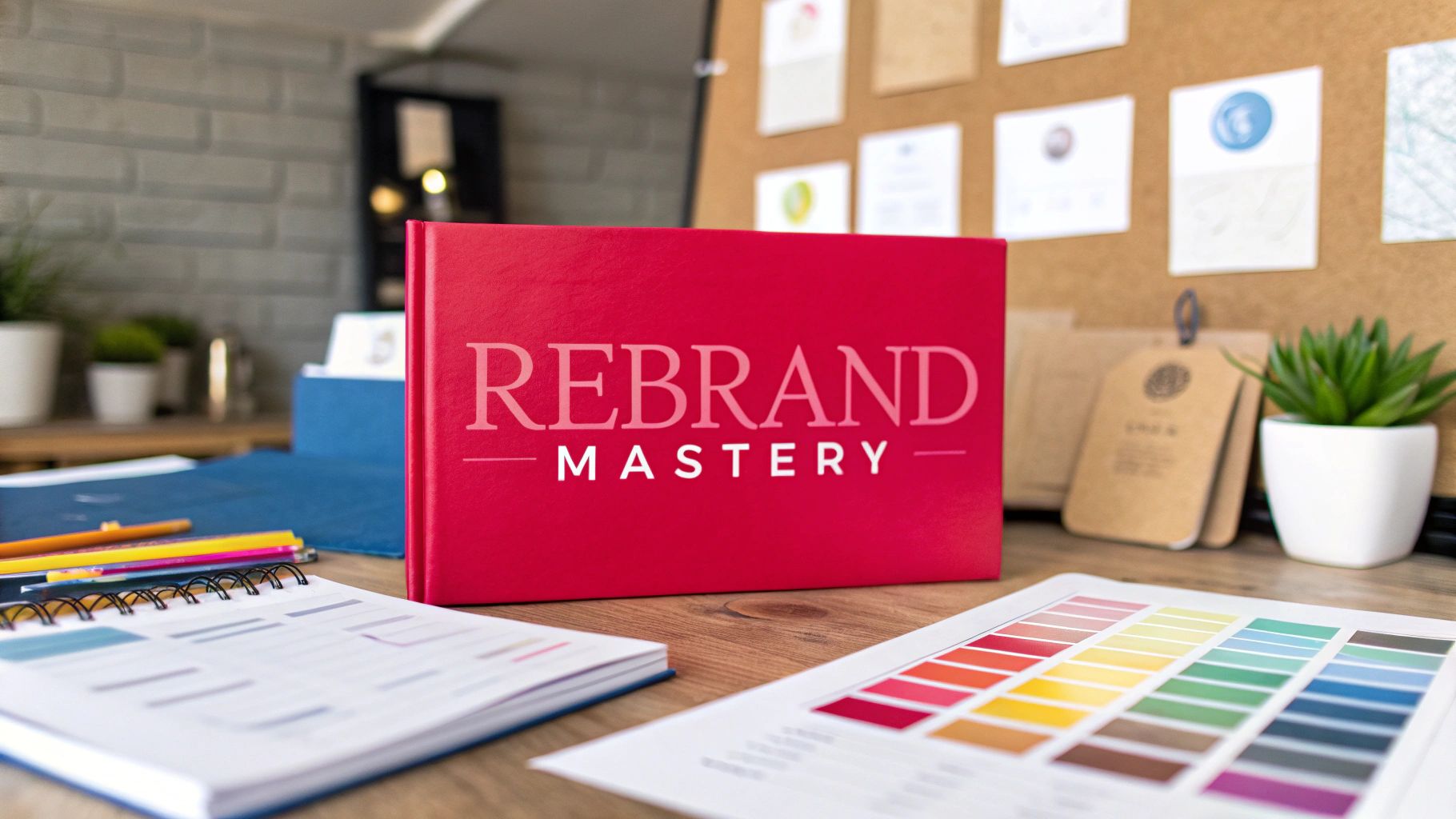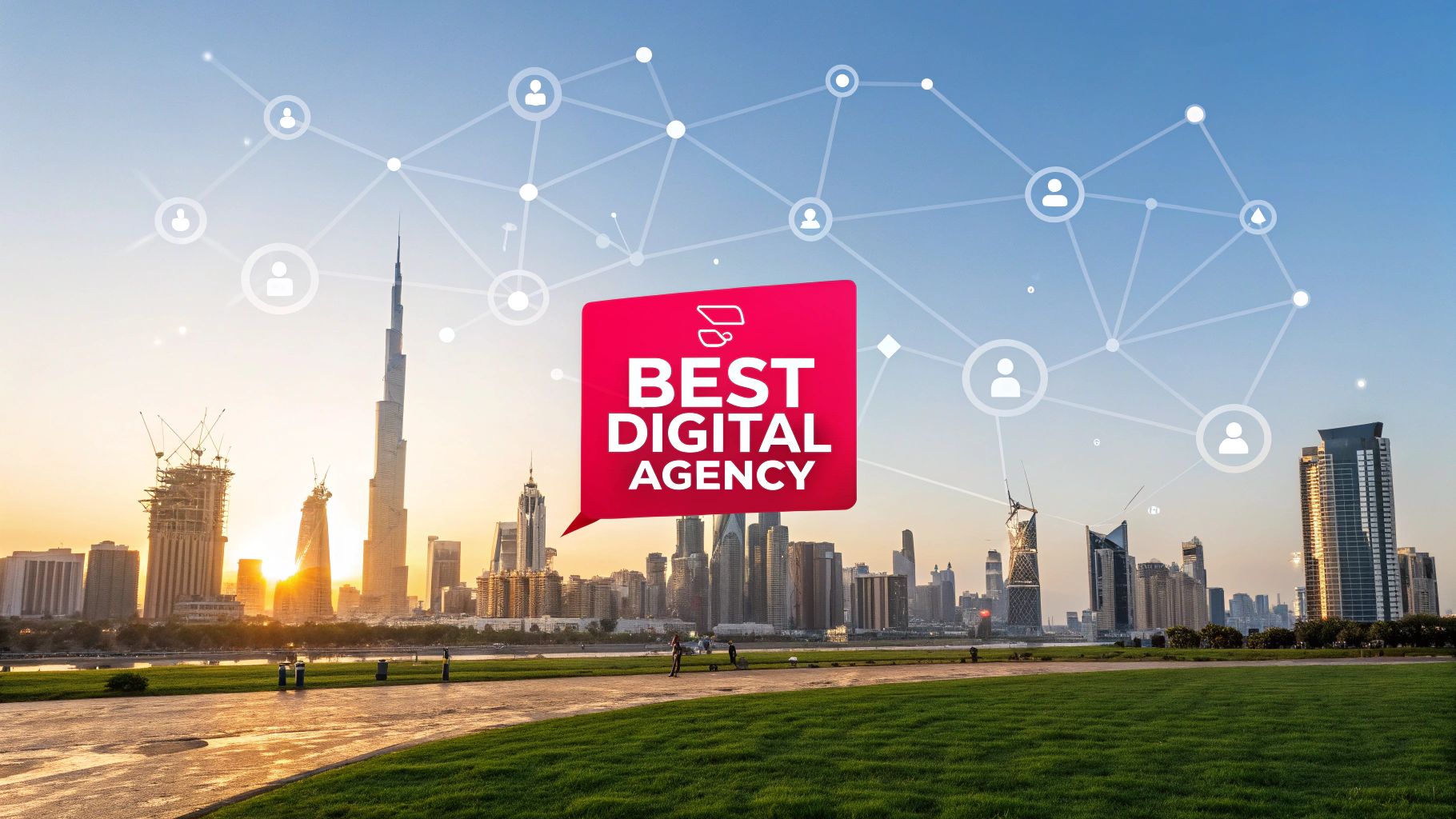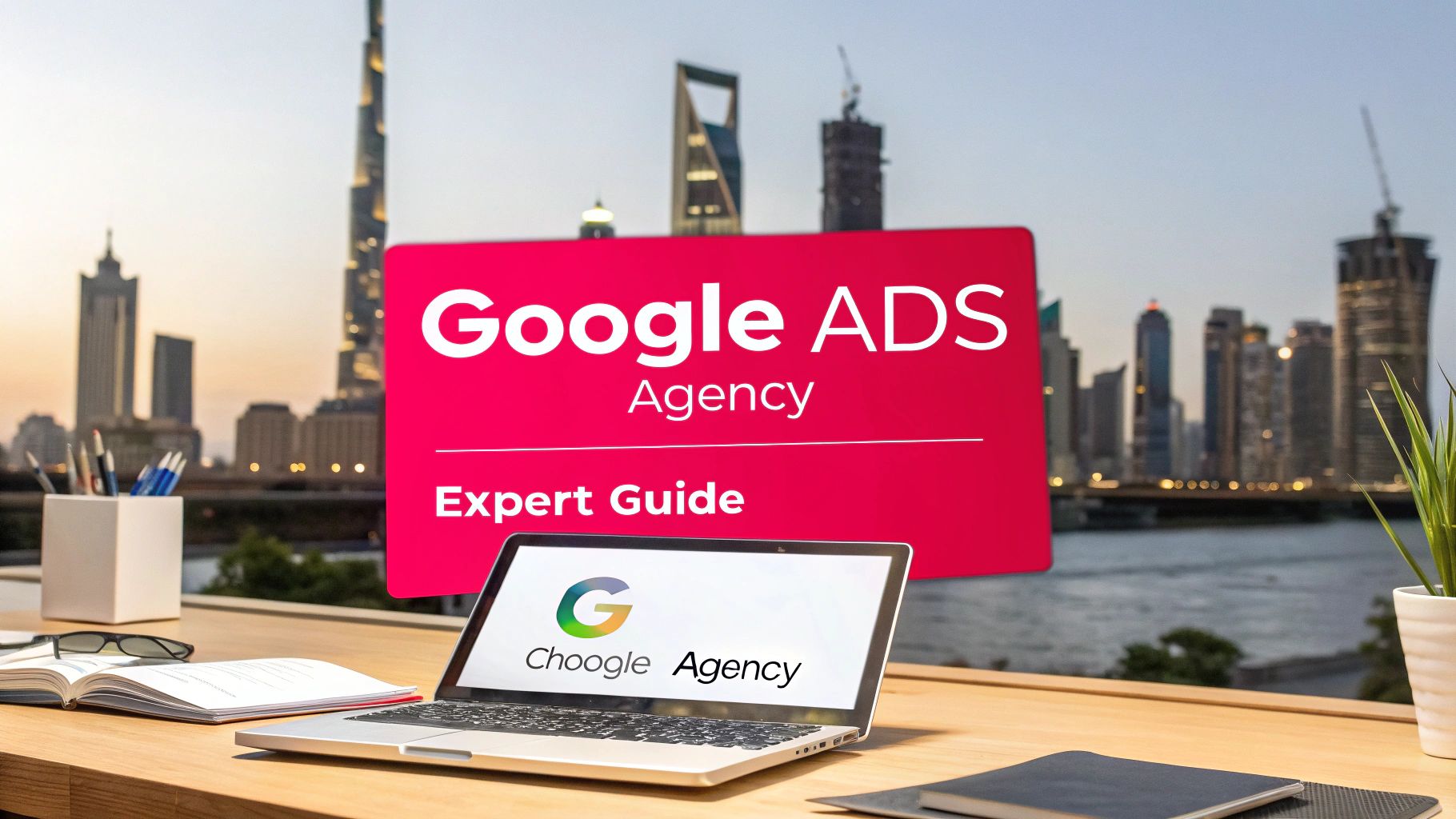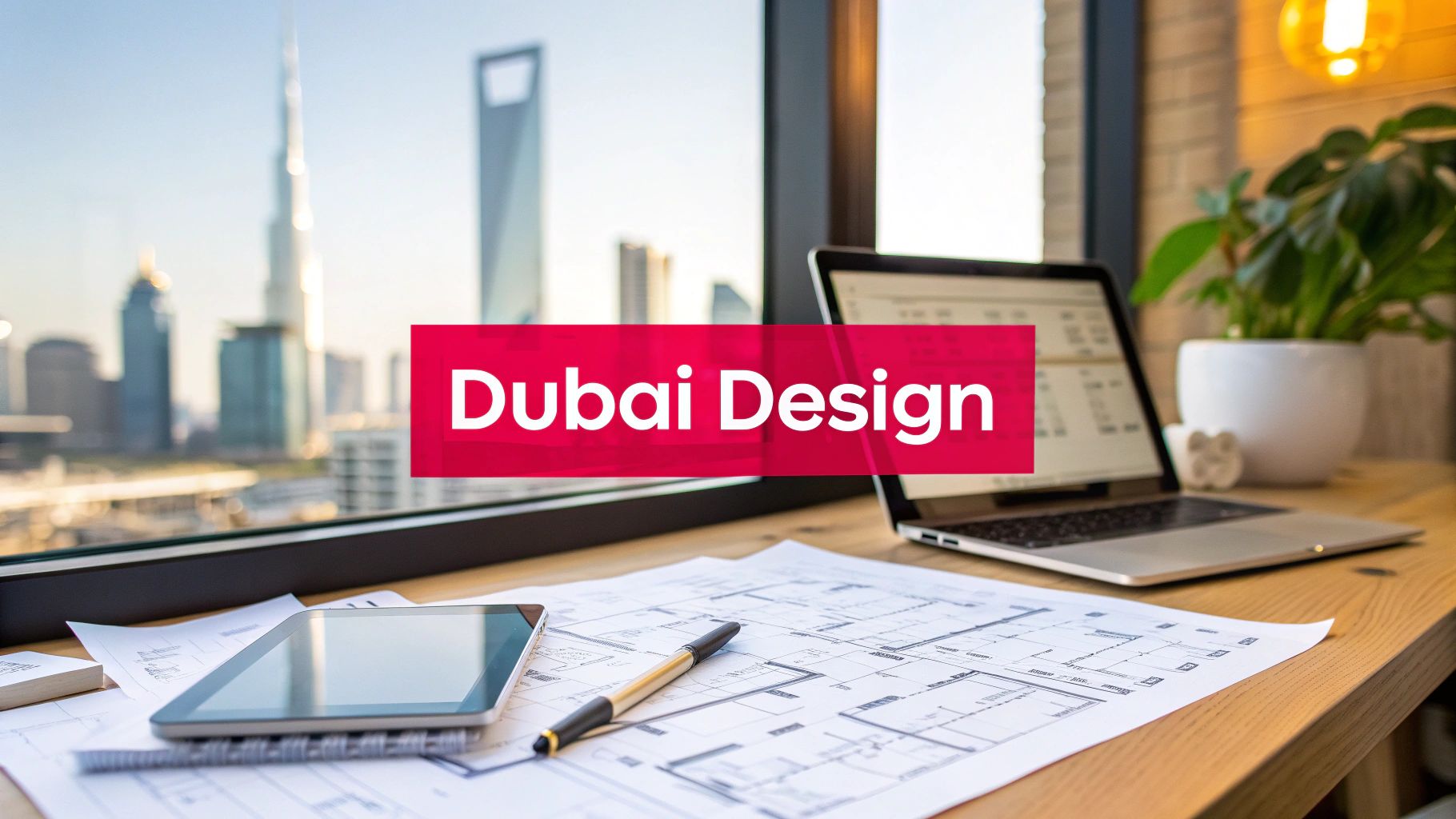Thinking about launching an ecommerce website in Dubai? You're looking at one of the most exciting and fast-growing digital markets on the planet. With nearly everyone online and a population that's incredibly comfortable with technology, Dubai is a prime location for any online business ready to make its mark.
Why Dubai Is Your Next Ecommerce Goldmine
Dubai is much more than a city of incredible skylines; it’s a powerhouse of digital commerce. The stars have truly aligned here for online entrepreneurs. You've got exceptional internet infrastructure paired with a population that has serious spending power. Shoppers in Dubai don't just idly browse—they are decisive, confident buyers who shop online frequently.
The recent surge in online shopping wasn't just a temporary shift; it's become a core part of how people live and shop here. This is the new normal. For any business with growth ambitions, a powerful digital storefront isn't just a nice-to-have, it's essential for staying relevant and competitive.
The Market by the Numbers
Let’s look at why this is such a compelling opportunity. The numbers speak for themselves. Before we dive into the details, here's a quick snapshot of the market's health.
| Dubai Ecommerce Market at a Glance | ||
|---|---|---|
| Metric | Figure | Source/Note |
| Market Size (2020) | $3.9 billion | Official U.S. Trade Guide |
| Market Growth (2020) | 53% | A significant acceleration in adoption. |
| Projected Market Size (2025) | $8 billion | Forecast indicates sustained, strong growth. |
| Internet Penetration (UAE) | ~99% | A massive, fully-connected audience. |
The UAE's ecommerce market isn't just growing; it's exploding. This rapid expansion is underpinned by a few key factors:
- Sky-High Internet Penetration: With virtually the entire population online, your potential customer base is enormous and always connected.
- Strong Consumer Confidence: Shoppers in Dubai expect quality and are happy to spend on everything from everyday essentials to luxury items online.
- Supportive Government Initiatives: The UAE government is a major advocate for digital business, creating a stable and encouraging environment for new ventures.
Hottest Product Categories
While you can sell almost anything online, a few sectors are clear winners. Knowing where the demand is can give your business a serious head start. Right now, the dominant categories for an ecommerce website in Dubai are electronics, fashion, and beauty products. These industries are well-established, fueled by savvy marketing and high consumer demand.
But that doesn't mean the big players have cornered the market. Niche areas are absolutely thriving. Think specialty foods, eco-friendly products, unique home decor, and personalised gifts. These are the spaces where smaller, more focused businesses can build a fiercely loyal customer base. It's all about finding an underserved corner of the market and delivering something truly special.
Key Takeaway: The Dubai ecommerce market isn't just for global retail giants. It’s a dynamic space with plenty of room for startups and niche brands to find their footing and succeed.
Of course, a great product is only half the battle. Success here hinges on understanding the local culture and what customers expect. We've put together a more detailed guide that digs deeper into the specifics of succeeding with ecommerce in Dubai, which is a great resource for planning your next steps. This market truly rewards businesses that focus on a top-notch user experience, from a beautifully designed site to fast, reliable delivery.
Securing Your Licence to Sell Online in Dubai
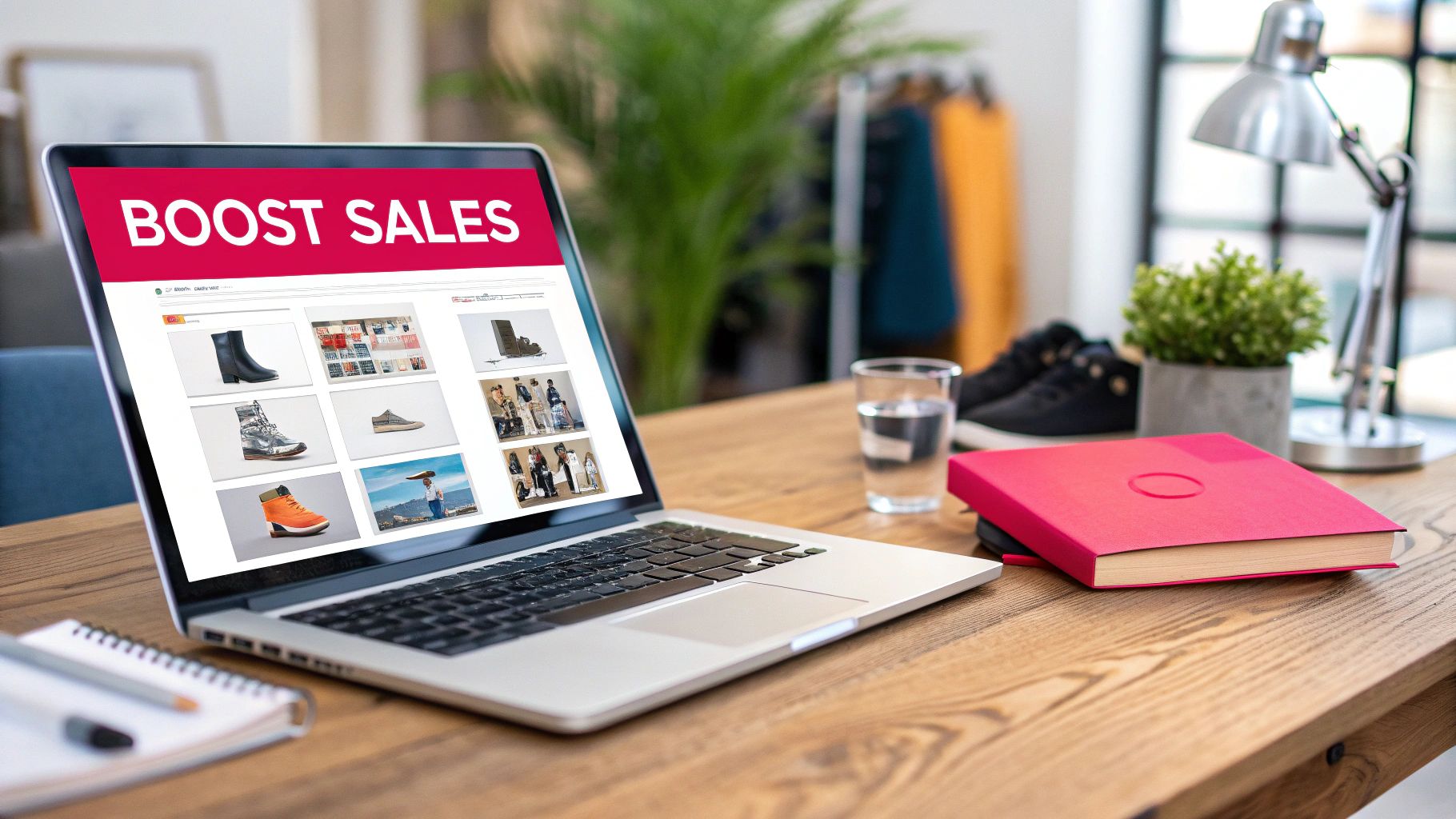
Before you can even think about making your first sale, you need to get your business on solid legal ground. Sorting out the licensing for your ecommerce website in Dubai is the first, non-negotiable step. Get this right, and you’re not just operating legally; you’re building crucial trust with your customers from the get-go.
This isn’t just about filling out forms. It’s a strategic decision about the legal structure that best fits your business goals. Your path will really depend on what you're selling, who you're selling to, and where you see your business in a few years. Essentially, you have three main routes: setting up on the mainland, in a free zone, or with a freelancer permit.
Mainland Versus Free Zone: The Core Decision
The first big question for most entrepreneurs is whether to go for a mainland or a free zone licence. A mainland licence, which you get from the Dubai Department of Economic Development (DED), is your ticket to trade directly with anyone, anywhere in the UAE. If you have plans to open a physical shop one day or want to bid on government contracts, this is the way to go.
On the other hand, a free zone licence has some pretty attractive perks, like 100% foreign ownership and no personal or corporate income tax. Free zones are special economic areas with their own rules, making them a magnet for international entrepreneurs. The catch? Traditionally, you’re limited to trading within that zone or internationally. To sell to customers on the UAE mainland, you’d usually have to work with a local distributor.
Choosing your jurisdiction is the most critical decision in your setup journey. A mainland licence offers unrestricted market access within the UAE, while a free zone provides ownership and tax benefits, making it ideal for businesses focused on international trade or operating purely online.
Understanding Your Licensing Options
Let’s get into the practical side of things. Which licence actually makes sense for your business?
-
DED Trader Licence: This is a brilliant starting point if you're a solopreneur or running your business through social media from your home in Dubai. It lets you sell online legally without the expense of a physical office, which is a huge plus when you're just getting started.
-
E-commerce Licence (Mainland): Think of this as the full-package deal from the DED. It gives you complete freedom to trade across the UAE, open physical stores, and scale up without hitting any jurisdictional walls. This is the go-to for serious businesses with big ambitions.
-
Free Zone E-commerce Licence: Dubai has over 40 free zones, and many of them offer ecommerce licences. These are perfect if your customer base is mostly outside the UAE or if you're running a dropshipping model. I've also found the setup process here is often quicker and a bit more straightforward than on the mainland.
It can be really helpful to see what others have done. Looking at a list of established https://grassrootscreativeagency.com/e-commerce-companies-in-dubai/ can give you a real-world perspective on how successful ventures are structured.
Staying Compliant Beyond the Licence
Getting your trade licence is a huge milestone, but it's really just the beginning. To keep your business healthy and out of trouble, you need to stay on top of your ongoing legal duties. This means following consumer protection laws, which cover everything from your return and refund policies to product warranties. You also need to be sharp on data protection rules for how you handle your customers' information.
Then there's the financial side of compliance. A clear understanding VAT regulations is non-negotiable. If your annual turnover hits the mandatory threshold of AED 375,000, you absolutely must register for Value Added Tax (VAT). From there, you'll need to collect it on your sales and file regular returns. Staying on top of these financial and legal details is what will keep your ecommerce website in Dubai running smoothly for the long haul.
Choosing Your Ecommerce Platform and Tech Stack
Your ecommerce platform is the very engine of your online store. Picking the right one for your ecommerce website in Dubai isn't just a technical detail—it's a massive business decision that will shape everything from your customer's first click to your ability to grow. This is where your brand's vision has to meet the hard reality of what the technology can actually do.
The sheer number of options can feel overwhelming. Do you go for an all-in-one solution like Shopify for its sheer ease of use, or do you opt for a more hands-on platform like WooCommerce that gives you total creative control? Honestly, the right answer boils down to your specific business model, how comfortable you are with technology, and where you see your business in a few years.
Comparing The Top Contenders For Dubai
For businesses setting up shop in Dubai, the choice usually narrows down to a few key players. Each one brings something different to the table, catering to different kinds of entrepreneurs.
-
Shopify: This is often the first stop for startups and smaller businesses, and for good reason. Its main appeal is simplicity. You can get a slick, professional-looking store online in a surprisingly short amount of time, no coding degree required. More importantly for this market, it plays nicely with local payment gateways like Telr and PayTabs, making it a reliable choice for the UAE.
-
WooCommerce: If your business already has a home on WordPress, WooCommerce is the logical next step. It's an open-source plugin, meaning it’s free to get started, but you'll have to budget for hosting and potentially some premium add-ons. The real prize here is flexibility. If you can dream it, you can probably build it with WooCommerce, which is perfect for brands that want a completely unique digital storefront.
-
Magento (Adobe Commerce): This is the heavy-hitter. Magento is a powerhouse platform designed for larger, more established businesses with complex inventories and high sales volumes. It’s packed with advanced features for managing multiple storefronts and currencies, but it definitely comes with a steeper learning curve and higher development costs. It's complete overkill for a small startup but an absolute necessity for an established retailer making a serious move online.
To get a head start, checking out the best ecommerce platform for small business can help you pinpoint a solution that will grow alongside your ambitions.
To help you visualise the options, here’s a quick breakdown of how these platforms stack up for a business operating in Dubai.
Ecommerce Platform Comparison for the Dubai Market
| Platform | Best For | Local Payment Gateway Support | Pricing Model | Key Feature |
|---|---|---|---|---|
| Shopify | Startups & SMBs | Excellent (Telr, PayTabs) | Monthly Subscription | All-in-one ease of use |
| WooCommerce | WordPress Users | Good (via extensions) | Open-Source (hosting costs) | Unmatched customisation |
| Magento | Large Enterprises | Strong (requires integration) | Custom/Enterprise | Scalability & B2B features |
Ultimately, the platform you choose should align with your resources and long-term goals. A simple Shopify store might be perfect for launch, with a migration to a more robust system planned for the future.
Beyond The Platform: Building Your Essential Tech Stack
A great ecommerce platform is just the foundation. To run a lean, efficient online business, you need a supporting cast of tools—what we call your tech stack. These are the unsung heroes that handle everything from customer relationships to inventory management, making sure your operation runs like a well-oiled machine behind the scenes.
Think about your Customer Relationship Management (CRM) system. It’s so much more than a digital address book; it’s your command centre for understanding customer behaviour, managing marketing campaigns, and offering personalised service that builds loyalty. Likewise, good inventory management software is what stops you from selling out of your most popular items or getting stuck with products that just won't move.
The real magic happens when these tools talk to each other. Your inventory system needs to communicate seamlessly with your website so stock levels are always accurate. Your CRM should link up with your email marketing platform to send automated messages based on what a customer has bought before. A properly integrated tech stack creates a smooth flow of data that saves you a massive amount of time and prevents costly mistakes.
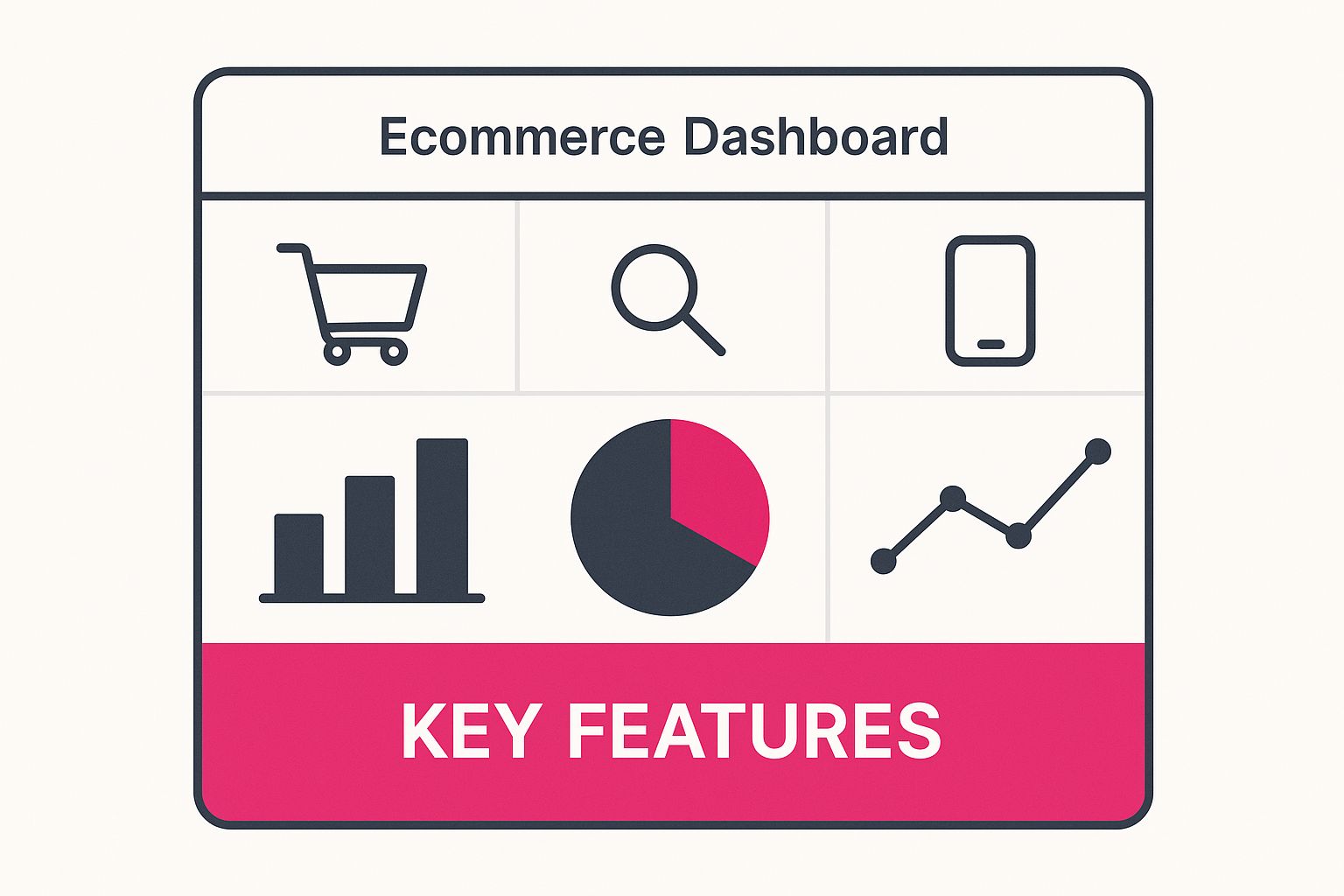
Localisation Is Non-Negotiable
For any ecommerce website targeting Dubai and the wider UAE, localisation is absolutely critical. This goes way beyond just showing prices in AED. Your platform has to support both English and Arabic effortlessly, not just on the product pages but through every single step of the checkout process.
A seamless bilingual experience isn't just a feature; it's a sign of respect for your local audience. If a customer has to switch languages halfway through a purchase, you've created a point of friction that is very likely to end in an abandoned cart.
You also have to consider the local market's preferences. The UAE's ecommerce landscape is incredibly diverse. Apparel is the largest category, with 6,520 stores making up 17.7% of the market. It's followed closely by home and garden with 5,370 stores (14.57%), and beauty and fitness with 4,250 stores (11.53%). This data shows just how important it is to pick a platform that can handle the unique needs of your niche, whether that’s complex size and colour variants for fashion or detailed specifications for home goods.
Mastering Local Payments and Logistics
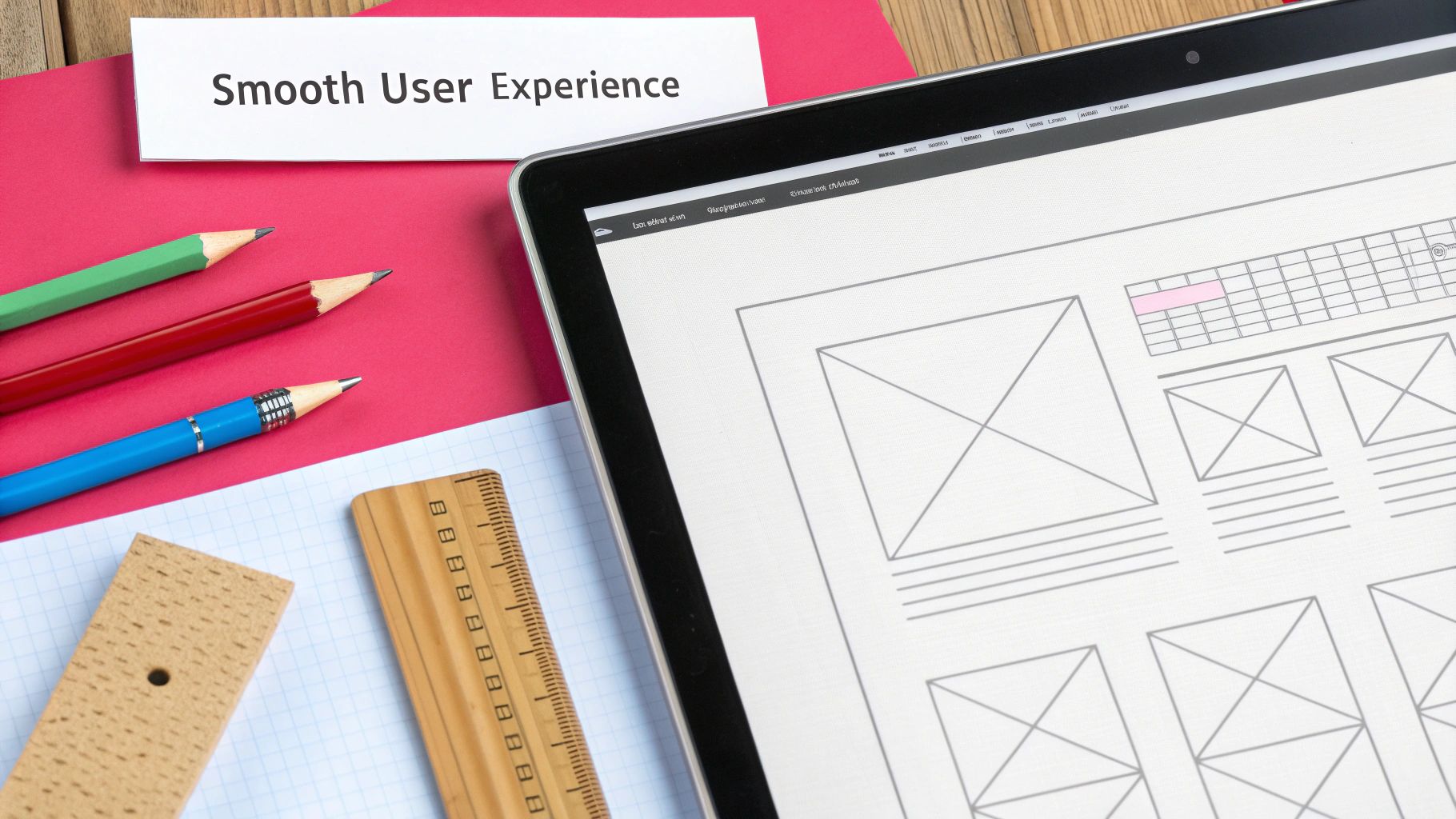
Once your website is live, the real work begins. Your focus now pivots to the two pillars that genuinely make or break customer satisfaction in Dubai: payments and delivery. A beautiful store is just window dressing if the checkout is a nightmare or the package shows up late.
In a market where convenience is king, getting these operational details right isn't just a good idea—it's non-negotiable for any successful ecommerce website in Dubai. Your checkout experience is your final, most crucial sales pitch. If a customer hits any friction there, they’ll abandon their cart without a second thought.
Choosing The Right UAE Payment Gateway
Integrating a reliable payment gateway is one of the most critical technical steps you'll take. These services are the secure bridge between your website and your customer's bank, and in the Dubai market, you need a provider that understands local preferences inside and out.
Here are the top contenders and what I've seen them do best:
- Telr: This is a homegrown favourite, especially for startups. I've always been impressed with their robust security and supportive team. They offer multiple pricing plans and support recurring payments, which is a massive plus if you're running a subscription model.
- PayTabs: Another regional leader, PayTabs shines with its straightforward integration and powerful invoicing features. It’s a solid, all-around choice that offers fantastic fraud protection tools.
- Stripe: While a global giant, Stripe has a strong, localised operation in the UAE. It’s prized for its clean developer tools and refreshingly transparent pricing, making it a go-to for more tech-savvy businesses.
The digital payment scene here is exploding, driven by government initiatives like the mandatory 'UAE Pass' and the massive adoption of mobile wallets like e& money. With the local ecommerce market projected to hit $11.05 billion by 2025, optimising your checkout for these modern payment methods is essential. This in-depth analysis of the UAE eCommerce market offers some great insights into this trend.
The Rise of Buy Now, Pay Later (BNPL)
Beyond traditional cards, you absolutely have to consider 'Buy Now, Pay Later' (BNPL). Services like Tabby and Tamara have become incredibly popular. Offering them can genuinely boost your conversion rates, especially for higher-priced items. Customers love the flexibility, and it shows your brand is in tune with how people shop today.
Crafting a Winning Logistics Strategy
Getting your product into your customer's hands quickly and reliably is the final piece of the puzzle. Dubai shoppers have incredibly high expectations; same-day or next-day delivery is the standard, not a luxury. Your logistics strategy has to be cost-effective for you but feel premium to your customer.
Key Insight: In Dubai's competitive market, shipping isn't just a cost—it's a marketing tool. A fast, reliable, and transparent delivery experience can be one of your strongest brand differentiators and a key driver of repeat business.
You have a few routes you can take when planning your fulfilment.
Local Courier Services
For new businesses, partnering with established local couriers like Aramex or Fetchr is a smart starting point. They have the networks and expertise to handle last-mile delivery efficiently. This approach also lets you keep control over your own packing and branding, which is great for building that initial customer connection.
Third-Party Logistics (3PL)
As you scale, managing inventory and packing orders becomes a full-time job. This is where a 3PL provider can be a lifesaver. They store your inventory, then pick, pack, and ship orders as they come in, freeing you up to actually grow the business.
Your choice will ultimately depend on your order volume, product type, and budget. My advice? Get quotes from several providers and really dig into their services, delivery speeds, and tracking capabilities. A poor delivery experience reflects directly on you, so choose your partners wisely.
Getting Your Brand Noticed in Dubai
Alright, you've got the operational side sorted. Now for the exciting part: getting people to actually visit your store and buy something. Marketing an ecommerce website in Dubai is a unique puzzle. You're not just selling to one homogenous group; you’re talking to a massive community of expats from every corner of the globe, alongside a deeply rooted and proud Emirati population. A generic, cookie-cutter marketing plan is doomed from the start.
Your success will boil down to how well you can craft messages and build a brand that resonates with this incredibly diverse audience. This isn't just about your ads—it's woven into your website's design, your social media voice, and every influencer you choose to work with. The aim is to build a brand that feels authentic, local, and, most importantly, trustworthy.
Your Digital Shopfront: Mobile-First and Bilingual
Before you spend a single dirham on advertising, your website itself needs to be perfectly tuned for the local market. In Dubai, that means two things are non-negotiable: a flawless mobile experience and a truly bilingual interface.
The vast majority of online shopping here happens on a smartphone. A slow, clunky mobile site is the digital equivalent of a locked door—customers will simply leave. Your design has to be clean, fast, and dead simple to navigate on a small screen.
Just as critical is offering a seamless experience in both English and Arabic. And I don't mean just running your text through a cheap translation tool.
- Right-to-Left (RTL) Layout: An Arabic version of your site must be properly coded for RTL display. This flips the entire layout, affecting everything from text alignment to how your menus work. It's a technical detail, but a crucial one.
- Cultural Nuances: The photos, graphics, and even the tone of your copy need to be culturally aware and appropriate for both audiences. What works for a Western audience might not land well here.
- Total Translation: Every single touchpoint has to be in both languages. That includes product descriptions, the checkout process, confirmation emails, and even customer service responses.
Getting this right shows genuine respect for the local culture and instantly makes a huge segment of your market feel seen and valued.
Crafting Your Local Marketing Playbook
With a solid website in place, you can start building a marketing strategy that genuinely connects with people in Dubai. It’s all about a smart mix of channels, combining a strong presence on social media with being easily found on search engines.
Expert Tip: Don't just translate your global marketing campaigns and hope for the best. Create content specifically for the UAE. Acknowledge local holidays like Ramadan and Eid, mention local landmarks, or tie promotions into community events. It shows your brand is actually present and invested in the region, not just an anonymous international entity.
Your marketing efforts should be focused squarely on the platforms where your ideal customers hang out. In the UAE, social media isn't just a place to chat with friends; it's a major hub for discovering new products and shopping directly. For a deeper dive into what works, our guide to social media marketing in the UAE is a great resource for building out your strategy.
Winning on Social Media and with Influencers
Platforms like Instagram, TikTok, and Snapchat have immense power in the UAE. Your brand needs to be there, creating eye-catching content that stops the scroll. Think high-quality product videos, sharing customer photos, and running interactive polls in your Stories to get people talking.
Influencer marketing is especially powerful here. Partnering with local creators who have a genuine rapport with their followers can give your brand a massive shot of credibility overnight.
Here’s a quick breakdown of where to focus your energy:
| Platform | Best For | Audience Demographics | Content Type |
|---|---|---|---|
| Fashion, Beauty, Food, Lifestyle | Broad; strong with the 25-45 age group | High-quality visuals, Reels, Stories | |
| TikTok | Gen Z, Young Millennials | Younger demographic (under 30) | Short, entertaining video clips, trends |
| Snapchat | Events, Promotions, Daily Life | Hugely popular among Emirati youth | Ephemeral content, behind-the-scenes |
When picking influencers, look past the big follower numbers. The best collaborations happen when an influencer's audience and values are a perfect match for your brand. A micro-influencer with a smaller but highly engaged, niche following can often deliver a much better return than a huge celebrity with a scattered audience.
My advice? Start small. Test collaborations with a few different creators and focus on building real, long-term relationships with those who genuinely love what you sell. That kind of authentic advocacy is what truly drives sales for an ecommerce website in Dubai.
Your Dubai Ecommerce Questions Answered
https://www.youtube.com/embed/xsVTqzratPs
Starting an ecommerce business in Dubai often feels like facing a mountain of questions. It's completely normal. From figuring out the real costs to understanding the launch timeline, getting clear answers is the first step to building the confidence you need to move forward.
Let's cut through the noise. Here are the straightforward answers to the most common questions we hear from entrepreneurs just starting out in this dynamic market.
What Is the Real Cost to Start an Ecommerce Website in Dubai?
This is always the first question, and the honest answer is: it varies. But it's not just about the website itself; you're investing in a full business infrastructure. Understanding where the money goes is key.
Your total investment will generally break down into a few core areas:
- Trade Licence: This is your biggest, non-negotiable upfront cost. A DED Trader Licence for a solopreneur is quite accessible, sitting at around AED 1,070. However, a full mainland or free zone ecommerce licence is a more significant investment, typically ranging from AED 15,000 to AED 35,000 (or more) for the first year.
- Platform Fees: Think of this as your digital rent. A basic Shopify plan is a great starting point, costing around AED 100 per month. If you opt for something more customisable like WooCommerce, you'll need to budget for premium plugins and specialised hosting.
- Website Design and Development: A simple, template-based site can be set up for a few thousand dirhams. If you're after a completely custom-designed store with unique features, working with a professional agency will be a much larger investment, often landing between AED 20,000 and AED 70,000.
- Payment Gateway Setup: While many gateways don't have a setup fee, they all take a slice of your sales. You can expect transaction fees to be around 2.5% – 3.5% + a small fixed fee on every purchase.
So, what's the bottom line? A lean startup, perhaps using a basic licence and a simple Shopify store, could realistically get off the ground for under AED 10,000. On the other hand, a more established business needing a custom-built site and a full mainland licence should budget upwards of AED 50,000 to cover all initial costs comfortably.
How Long Does It Take to Launch?
Time is just as valuable as money. The good news is that a well-organised entrepreneur can launch their ecommerce website in Dubai surprisingly quickly. Your timeline really hinges on your preparation and the complexity of your project.
Realistic Timeline: From the day you commit to starting until you process your first live order, you should realistically plan for two to four months. This window accounts for all the moving parts: legal paperwork, platform setup, content creation, and final testing.
Here’s how that time usually breaks down:
- Licensing and Legal (3-6 weeks): This is often the part that takes the most time. Gathering documents, waiting for approvals, and getting your corporate bank account set up requires patience.
- Platform Setup and Design (4-8 weeks): This phase can run in parallel with the legal work. It involves choosing your platform, designing the user experience, integrating payment and shipping solutions, and handling any customisations.
- Content and Product Loading (2-3 weeks): This is where your store comes to life. It includes everything from professional product photography to writing compelling descriptions and populating your website with all the essential information.
- Testing and Go-Live (1 week): Before the big reveal, this final week is dedicated to rigorous testing. You need to check everything—from adding items to the cart, processing a test payment, and confirming email notifications—to ensure a smooth launch.
Do I Need a Physical Office in Dubai?
This is a common point of confusion, but the answer is a welcome one for most online businesses.
No, you don't necessarily need a physical office to run an ecommerce website in Dubai.
The DED Trader Licence, for instance, was specifically created for home-based entrepreneurs and social media sellers who are Dubai residents. Many free zones also offer brilliant packages that include a flexi-desk or a virtual office solution. These options satisfy the requirement for a registered business address without the hefty price tag of a dedicated office lease. This flexibility is a massive advantage, lowering the barrier to entry and letting you funnel more of your capital into what matters most: your products and your marketing.
Ready to build an ecommerce brand that stands out in Dubai? At Grassroots Creative Agency, we create data-backed marketing strategies and stunning websites that turn visitors into loyal customers. Let's build your success story together. Schedule your free consultation today!


